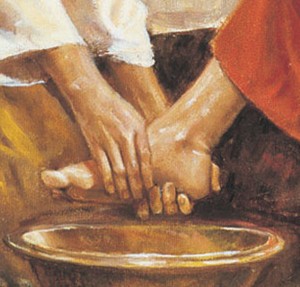Freedom and success are defined in a lot of peculiar ways in our culture. Whether understanding “freedom” as the opportunity to live a radically individualized life or “success” as the acquisition of wealth and reputation, our cultural definitions often hijack our ability to live fully into the individuals and communities God designed us to be. What might it look like to embrace a sacred vocation that frees us to live interdependent lives with God and neighbor, while discovering our best success is joining God in the world he is making?
The Tragedy of Self-Appointed Prophets
 The world is swirling with issues.
The world is swirling with issues.
Picking up my phone and opening my news app each morning is being met with more and more dread each day.
When something hits the news, it is fascinating to watch people jump onto social media and begin “yelling” out their answers for how to heal our broken systems.
Of course, there is almost always at least two completely different opinions for how these problems should be fixed, which typically leads to people drawing lines in the sand, picking their stance and not budging. Relationships often fracture and a polarized a world gets more polarized, rendering it immobilized for the work of reconciliation.
Whether it’s on our Facebook page, Twitter feed or around our table, I assume most of us can think of an interaction where this unhelpful and potentially destructive reality played out.
So, does this “yelling” of our opinions actually help heal the broken systems and the people whom those systems are breaking?
I’m all about using our voices to call out injustice. By offering a critique of power and a hope for those on the underside of it, the ancient prophets did this beautifully throughout history.
But, in a globalized, virtually interconnected world, I’m concerned we have too many self appointed prophets (which, by definition is NOT a prophet), and not near enough practitioners. Far more constructive than a verbal or written argument is actually doing something.
I don’t think the world needs more armchair advocates…especially when our arguing or defending leads to the fracture of real life relationships. I’m not saying we all need to passively waltz around the world’s issues. No, I’m proposing we actively engage them in two ways:
1. Healthy, constructive discourse that doesn’t require we all agree to remain in relationship
2. We spend less time talking, and use our best energy to actually do something
What this world needs are people who are willing to role up their sleeves and get dirty. And not for a week or a month or a year, but for the long haul.
The world needs people embedded in the center of these conflicts equipped with the practices that make for peace. These people don’t have time to debate solutions on social media because they are already hard at work making the solutions a reality. They don’t have to transplant themselves to the center of the issue, because they are already embedded in it. They don’t have to seek the approval of their constituency, because it’s not about their reputation, it’s about the flourishing of those they have been called to serve.
They are sharing meals with the forgotten in their neighborhood.
They are building lasting, mutually beneficial relationships with those of other faiths who we are often taught to fear.
They are sitting at the hospital bedside of the family who is suffering loss at the hands of unjust people and systems.
They are in the churches, schools and homes of our black and brown communities to listen, learn and support.
They are in detention centers and deportation shelters to pray with and look in the eyes of those in our society’s shadows.
They are encouraging and walking with our faith and political leaders as they navigate the potentially compromising positions of power.
It’s a way of life that is costly. It is not glamorous. And it often comes without our desired outcomes being met in the short term and, potentially, not even in the long term.
This is the work of a trained, strategic and intentional community of Jesus followers who are prepared to move to the center of our society’s conflicts with the weapons to transform rather than destroy. It’s the gritty, subversive and costly work of peacemaking.
More than ever, I believe the work of peacemaking is discipleship. It’s the long hard road of the cross that will lead to the flourishing of others and allow our deepest calling to meet the worlds deepest needs. May it be so.
————–
NOTE: The work of The Global Immersion Project is to train and mobilize the kind of people I describe. We call them Everyday Peacemakers. To learn more or participate in one of our international or domestic trainings, go here: http://globalimmerse.org
A Prayer for the Church in 2015
 I taught on “passion” at a conference on New Year’s Eve (strange, eh?!) and have been wrestling w/it’s implications for the Jesus Community in 2015. In Jesus, we see that passion looks like a cross. As such, passion for the Jesus Community looks like lives shaped by the cross for the flourishing of others. Passion is not a one-off experience of euphoric enthusiasm, it is the fuel that sustains our life-long sacrifice and commitment…day after day after day after day.
I taught on “passion” at a conference on New Year’s Eve (strange, eh?!) and have been wrestling w/it’s implications for the Jesus Community in 2015. In Jesus, we see that passion looks like a cross. As such, passion for the Jesus Community looks like lives shaped by the cross for the flourishing of others. Passion is not a one-off experience of euphoric enthusiasm, it is the fuel that sustains our life-long sacrifice and commitment…day after day after day after day.
In short, Passion looks less like raising hands in praise and more like bending a knee to wash each others feet.
Imagine a world where the Church spent less energy defending ideas and more energy inviting into a way of life.
Imagine a world where the Church spent less energy trying to “win” and more energy trying to give itself away.
Imagine a world where the Church gave its best energy to healing the wounds of the world, rather than creating more (whether intentionally or un-intentionally).
Imagine a world where the Church spent less energy seeking revenge on its “enemies” and more energy seeking to love them and pursue reconciliation.
Imagine a world where the Church, like Jesus, chose to daily bear a cross of suffering and self-sacrifice so that others may flourish.
The good news? The Church isn’t an idea; it’s you and me. Let’s start washing some feet.
May it be so for the Church in 2015.
Owning My Dysfunction and the Freedom of Dependence
 It was nearly five years ago that Janny and I moved to Golden Hill, a neighborhood in San Diego, to be part of a little faith community committed to love God and neighbor in some of the most tangible ways we had ever encountered. As you can imagine, we were curious as to what all this would mean for us as individuals, as a young family and for our role within the Church as a whole. It was a great unknown, but we were willing to “role the dice” and did so with much conviction.
It was nearly five years ago that Janny and I moved to Golden Hill, a neighborhood in San Diego, to be part of a little faith community committed to love God and neighbor in some of the most tangible ways we had ever encountered. As you can imagine, we were curious as to what all this would mean for us as individuals, as a young family and for our role within the Church as a whole. It was a great unknown, but we were willing to “role the dice” and did so with much conviction.
We could have never foreseen the beauty and richness that would birth forth out of a community of people committed to share life together as we stumble towards Jesus on the same streets, parks, homes, pubs and coffee shops. There was nothing flashy about it and I can remember thinking early on, “So this is it? Life just keeps happening day after day after day after day?”
I would soon realize that’s the beauty of it. Church wasn’t something we attended on our own time and at our own convenience, it was something we participated in every moment of everyday.
In fact, that was our path toward discipleship. It’s not an event, it’s nothing flashy and it certainly doesn’t lift our names/titles/roles above our neighbors. We can’t pat ourselves on the back after a successful event that brought in the masses; we can only love in such a way that we stand in each other’s pain and joy on Monday…and Tuesday…and Wednesday…There is no day off from discipleship or our commitment to a place and a people who inhabit it. And rather than grab for power or prestige, the road to discipleship requires we give it away for the flourishing of others.
When the preverbal sh*%t hits the fan in one of our lives or our neighbors lives, we sit in the middle of it. We certainly don’t always do this well, and we have a ton to learn, but we do our best to contend for one another in costly and creative ways.
Why? Well, because that is what we think Jesus meant when he said to love God and neighbor (Jesus went as far as calling us to love our “enemy”). In Jesus, we see that contending for others might even look like giving up your life.
In the end, embracing the Jesus’ way of the cross is really freeing. When I realize life isn’t about “me” (which I still struggle with EVERYDAY…ask Janny) and my flourishing, but about advancing the good of those around me, I am free to truly love and be loved. Because faithful discipleship doesn’t require that I am comfortable, that I will “succeed,” or even that I will survive.
It. Just. Doesn’t.
And when I spend so much of my time and energy seeking my personal advance, it highjacks my ability to follow Jesus and it does harm to those around me.
After three years of learning and being mentored by trusted guides, our little faith community was no longer little and had grown to the point where we needed to multiply (rather than get bigger, we multiply and start new faith communities). It was then that Janny and I were entrusted to lead one of the new communities.
We’ve now been leading and walking with this community of Jesus’ followers for over two years and this past Sunday night, we created some space to reflect and celebrate. Sitting around a bonfire, we shared what we have learned about God, ourselves and our neighborhood over the past couple years. It was beautiful and reminded me of the value of simply acknowledging and celebrating the good gifts of this life.
We shared about the times we helped pay each others rent when one of us was struggling financially.
We shared about the gift of new friendships with neighbors where we learned about Jesus in the most unexpected and beautiful ways.
We shared about the gift of vulnerability and transparency.
We laughed at the many days where we took care of each other’s kids because we were all sleep deprived.
I confessed that I simply can’t follow Jesus alone and that this community has helped me own that. We all know the point isn’t community in and of itself, but that community is a means and context for us to all more faithfully follow Jesus.
Bottom line: I need a community of practice that requires me to live the stuff I spend so much time talking about. If I don’t have a community and neighborhood that invites me to give myself away in the way Jesus gave himself away, I miss out on living into who I was created to be. And, those around me miss out on the gift I have been created to give to the world.
We concluded the evening by offering prayers of blessing and sending over our community as we move towards the start of another year. Mine was simple and I think it was meant more for me than anyone else:
“May we receive the gift of community we have been given with deep gratitude. And may we not see this way of life as a list of obligations to fulfill, but as an opportunity for each of us to be fully human.”
———–
NOTE: Paul’s words in Philippians 2:1-11 offer a beautiful picture of the above based on the life of Jesus and the activity of the early Church.
The Holidays: Anxiety & Consumption or Presence & People
 As we enter the holiday season, the lure of “necessary” excess and the myth of a consumption that satisfies will steadily grow stronger. This is not a reality in every culture, but it is front and center in ours.
As we enter the holiday season, the lure of “necessary” excess and the myth of a consumption that satisfies will steadily grow stronger. This is not a reality in every culture, but it is front and center in ours.
It for this reason that I offer this timely and prophetic quote from a faith father that is probably more relevant today than it was when he said it 1500 years ago.
Fifth-century monk Nilus of Ancyra wrote,
“We should remain within the limits imposed by our basic needs and strive with all our power not to exceed them. For once we are carried a little beyond these limits in our desire for the pleasures of life, there is then no criterion by which to check our onward movement, since no bounds can be set to that which exceeds the necessary.”
As we stumble toward a Jesus who taught us to pray, “Give us this day our daily bread (nothing more and nothing less),” I offer this blessing as we navigate the beauty and brokenness of this holiday season.
May we find our deepest satisfaction not in what we receive, but in what we give away.
May we receive genuine relationship with family and neighbor as our most sacred gift.
May we free ourselves from the bondage of consumption that captures our time and imagination.
May the anxiety of lists and busyness be lifted and exchanged by the richness of laughter and presence.
May we care for the creation God has given us to steward by choosing less in the face of more.
May we be reminded, each day, of the reality of a God who moved into our human neighborhood in Jesus, announcing that another world is possible which comes into view a little more through our participation today.